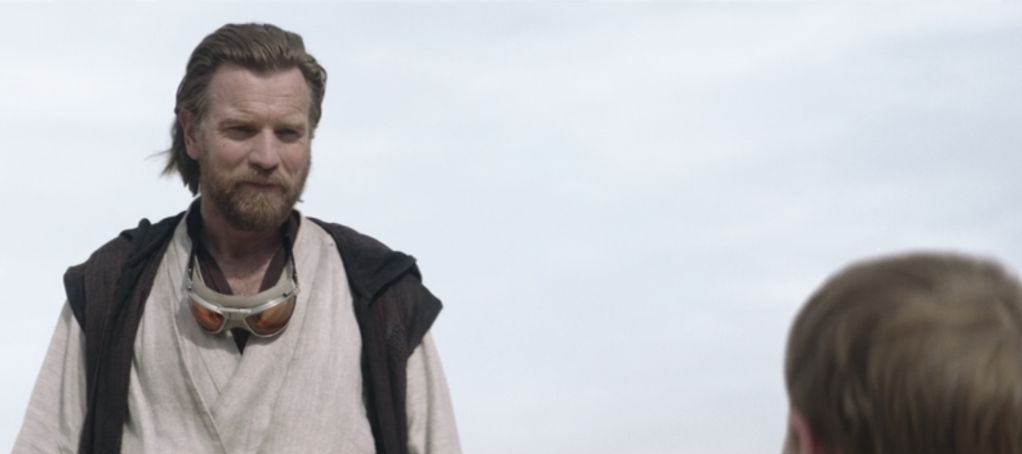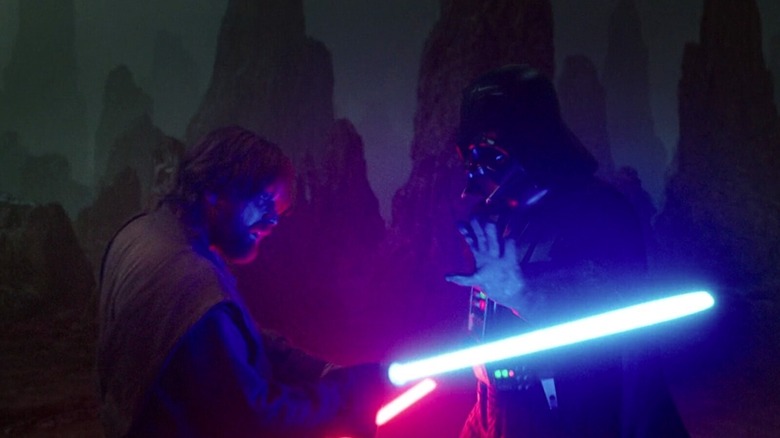This review contains spoilers.
Today marks the Obi-Wan Kenobi series finale, and it was a very emotional episode in several contexts that offered a lot of closure.
Let’s begin with Reva, whose backstory I found lackluster. I was concerned that whatever happened in this episode would continue to bounce her character around without thought or purpose. In some ways, I was right, because her decision to kill Luke in search of justice still makes no sense, and is definitely the writers shortcutting her motivations. That said, they absolutely nailed her character’s denouement. If they do not contract a Black writer to tell more of her story, I will be very disappointed.
Even though the plot is not Star Wars’ strength, I had a hard time swallowing that Reva returned to Tatooine so fast (where did she get a ship?), and I’m also struggling to understand how she knew the children or the boy Bail referenced was Anakin’s, because how else could she seek justice unless she knew the “children” were his? Obi-Wan deduced that Anakin was the father with Padmé, viewers know immediately whom Bail is talking about, but is it conceivable that Reva, with her existing knowledge, would know these aren’t just force sensitive kids, but Anakin’s kids? If she only knows they are Force sensitive kids, then how could she gain justice by killing them? Her desire for it only makes sense in the context she knows Luke is Anakin’s son. As a youngling in the temple, she probably hadn’t even seen a glimpse of Padmé and Anakin together. Like so much of Reva’s character, it doesn’t make sense, and even though I loved what they did at the very end, the beautiful significance of it is somewhat undercut by the haphazard buildup.
Reva pursues Luke into the desert, running after him in a dark robe reminiscent of Anakin’s as he marched upon the temple. She identifies with Luke as she relives her own trauma with Order 66, which causes her to bring him back to his aunt and uncle, whom Obi-Wan has already rejoined. “Have I become him,” she asks through her tears, while Kenobi assures her she hasn’t because of her choices, and that, essentially, she can choose not to be him, that she can be whoever she wants to be. This is a great, beautiful moment, the epitome of Star Wars, because it reaffirms that you can still choose to be who you want to be, or to stop being someone you don’t want to be.
And Reva is no exception as she lets the sand have her saber, effectively mourning the scared, traumatized child of her past, the knighthood stolen from her, and burying the inquisitor she became as she steps into her new life, her new self.
Obi-Wan affirms this for her after she brings Luke home in the same way Luke affirms it for Vader a decade later. For all Star Wars’ talks of destiny, its emphasis on choice is truly inspiring, and I’m so glad Reva got to have that moment.

Obi-Wan has more purpose and resolution of spirit as he confronts Vader. The duel this time is different–still powerful, but the desperation is less. Even after Vader buries Obi-Wan under rubble, Obi-Wan finds renewed hope as he remembers Leia and Luke after he stops thinking back to Anakin, which gives him the strength to break free of the grave Vader has created for him. It’s symmetrical that it’s also Luke and Leia who give Anakin the strength to break free of the Emperor.
They weren’t trying to be subtle with this metaphor, and I’m so glad because it’s lush, it’s big, it’s over the top, just like Star Wars has always been. The final, shining brush stroke is made by Vader, peering at Obi-Wan through his cracked and broken helmet as with Ahsoka a few years later. “I am not your failure,” he says.
This frees Obi-Wan, whose last words to Anakin were “I have failed you.” It’s natural to feel that way when someone you love, someone you taught, does the antithesis of who you thought they were. Exiled on Tatooine, it’s easy to imagine the cycle of self blaming thoughts: if only I hadn’t gone to Utapau, if only I hadn’t used Padmé to get to Anakin, if only, if only, if only.
But Anakin was a full grown adult, a knight with a seat on the counsel, which makes the tragedy of what happened between them, their perceived betrayals, hurt even more.
Obi-Wan hearing Vader say it wasn’t his fault, that it was himself and himself alone who killed Anakin, provides absolution for Obi-Wan. He is free of his guilt and shame. He becomes the Obi-Wan fans met in A New Hope, both in his mannerisms, his bearing, and that he finally has the mental clarity to perceive Qui-Gon within the Force. And yet, he’s also very much himself as well. As before, he leaves Anakin behind, again, a stark contrast to Ahsoka swearing she wouldn’t leave him, not this time.

It leads the way for their final interaction in A New Hope. Obi-Wan relinquishes all hope that his friend, his brother, is in there and refers to him only as Darth because, from a certain point of view, Vader is Anakin. As before, Obi-Wan leaves him behind.
Vader, on the other hand, says in A New Hope that he hasn’t felt this presence since…and he trails off with a dramatic cape flair that is so Anakin. In the past, it’s easy to believe he was referencing Mustafar, but I’m glad Kenobi made it canon he’s referencing this pivotal moment between them–this moment when he absolves Obi-Wan and takes responsibility for what he has done, no longer perceiving himself as Obi-Wan’s permanent Padawan, as confirmed in the previous episode. What a journey from “I am what you made me” to “I am not your failure” to “I killed Anakin Skywalker.” No wonder he’s able to say with confidence that he is the master now when next they meet. But this moment also paves the path of self agency to “I am Luke’s father, and I refuse to let him die” thus becoming Anakin Skywalker again.
It’s poetry.
The acting in this moment was also phenomenal. The vulnerability, the tears, the shattered apology. I was clutching my heart the entire time.
The final moments are a denouement for the remaining characters. Owen gets over his grudge a little bit, and allows Obi-Wan to officially meet Luke with his signature, “Hello, there” and the toy. The fate of the Lars weighs heavily as Owen promises to take care of Luke, to protect him.
We see young Leia looking more like her adult counterpart as she straps Tala’s holster to her waist. Obi-Wan confirms he knows her parents, and what he sees of them in her, but Leia mirrors these qualities back to the Organas as she accepts them as her true parents. His “no one must know” provides context as to why Leia only referenced his history with her father a decade later when she does need the help of a tired old man who is her only hope. We regret that Leia was never shown grieving her planet, her parents, and the stolen reunion with her friend, Obi-Wan Kenobi.
Overall, this was an incredible finale to Obi-Wan Kenobi.